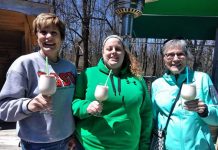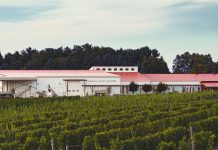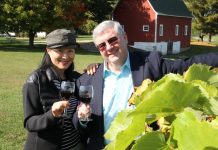
Greg Hall grew up in Chicago, but his family traveled to the South Haven and Saugatuck areas of Southwest Michigan every summer when he was growing up. He describes those trips as “the two best weeks of the year.” As an adult, he went into brewing beer and traveled frequently to England, where he came upon a cider festival in 2000. He was “blown away by the variety,” and the seed for what was to become Virtue Cider was planted. In 2011, he left his job as brewmaster at Chicago’s Goose Island Beer Company to establish Virtue Cider in Fennville. While the company was actually purchased by Goose Island in 2015, Hall still runs it. Today, Virtue offers tastings at its headquarters and is distributing in multiple midwestern and eastern states, as it just expanded with construction of a third cider house.
What did you think cider was like before that festival experience in England?
Hall: (I believed) that there were two flavors of cider — sweet and sweeter. Then we went over to England and tried ciders that were hard and dry and full of tannins, barrel-aged, naturally fermented, kind of funky — all these flavors that we were used to from wine and beer and Belgian ales were in cider, too. And it got me really excited thinking that there’s new ground out there — opportunity to bring these flavors to America. And right here to Michigan.
How did you go about learning to make your ciders?
Hall: I spent a big part of the summer and fall in 2011 in England and France, visiting cidermakers, staging (like an unpaid internship) at a cidermaker in France. I did that at Domaine Dupont in Normandy back in 2011. Dupont was kind of my French cider or Norman cider inspiration; Tom Oliver was kind of my English mentor.
What did you learn?
Hall: There were three important things. That all these cidermakers, not just Oliver and Dupont — many of the best cidermakers I visited — had in common. One, they either grew their own fruit or bought it from their neighbors. Number two, everybody aged their cider in oak barrels. And then thirdly … everybody was making their cider on a farm with all of the characteristic microflora that would be on a farm.
Did you model your operations after what you learned across the pond?
Hall: Absolutely. I knew I wanted to be in Michigan where the fruit was. And I didn’t need to grow them myself because I knew so many people who were already growing apples. Number two, at Goose Island, we got an early start on barrel-aging beer back in the ’90s, so I had some good contacts for barrels. And number three, I needed to find a place and one popped up right here in the Fennville AVA … that seemed like the perfect place. We bought our 48 acres and started Virtue.
Do you live there?
Hall: I don’t live on the farm, I live about five miles away. In country terms, that’s next door.
Why did you name it Virtue?
Hall: Virtue came from two sides. One is as a brewer, you really work on a schedule — brewing is following a recipe and following procedure … you get a predictable result. And cider is much more like winemaking or making soup. It’s a little bit different every time … Cidermaking is more like patience. You put an apple tree in the ground, you get harvest in five to 15 years and you harvest in the fall and once you make your cider and put it in a barrel, it’s ready when it’s ready. There’s no time put on it. Patience. Which, of course, is a virtue. The other part is that I’ve long been fond of trees and trees are the most virtuous living things on the planet: They shade the earth, they hold the soil tight, they pull carbon dioxide out of the atmosphere and sink it in the ground, they provide fruit year after year, you don’t have to replant them. Every year, there’s more fruit. And the fact we’re using fruit from a tree and we’re aging it in a barrel made from a different tree, the cider house is made from eastern white pine — we’re kind of honoring the tree, which we believe is so full of virtue.
What facilities do you have there?
Hall: We added a third barn that just opened up this year. The first one we call Cider House One where we do our apple pressing and have a lab. And then Cider House Two, we dug out a cellar so all of our tanks are about 20 feet under grade, and we do as the English and French do — we let the ground keep our cider cool. We don’t use refrigeration. And Cider House Three that just opened up is a full-time barrel house. We’ve had a tasting room, but since COVID we’ve kind of closed the internal parts and now it’s just outside. We have a number of picnic tables and Adirondack chairs and we’re open 52 weeks a year … we find the people really like being outside. We do also offer three greenhouses for the days that are not quite as sunny that you can reserve.
When you got into cider, it seems you were ahead of the curve. Cider hadn’t taken off yet like it has now. Did you anticipate this when it was just a twinkle in your eye?
Hall: When it was a twinkle in my eye, everybody thought I was crazy for getting into cider, because you’d go into a better party store and you’d see, like in Chicago, you could go to a place like Binny’s and you’d see a thousand different beers, a thousand whiskies, 5,000 wines and four ciders. There were more types of olives or French onion dip than there was cider back then. It seemed like there was just a lot of opportunity. So, my timing was fortunate — not necessarily prescient. Just as with beer, I was kind of right place, right time.












Facebook Comments